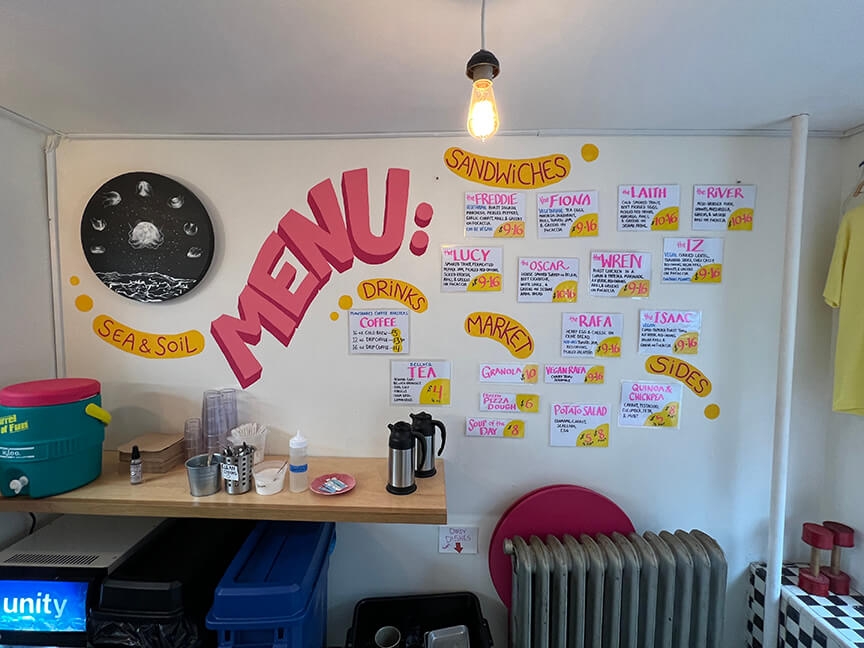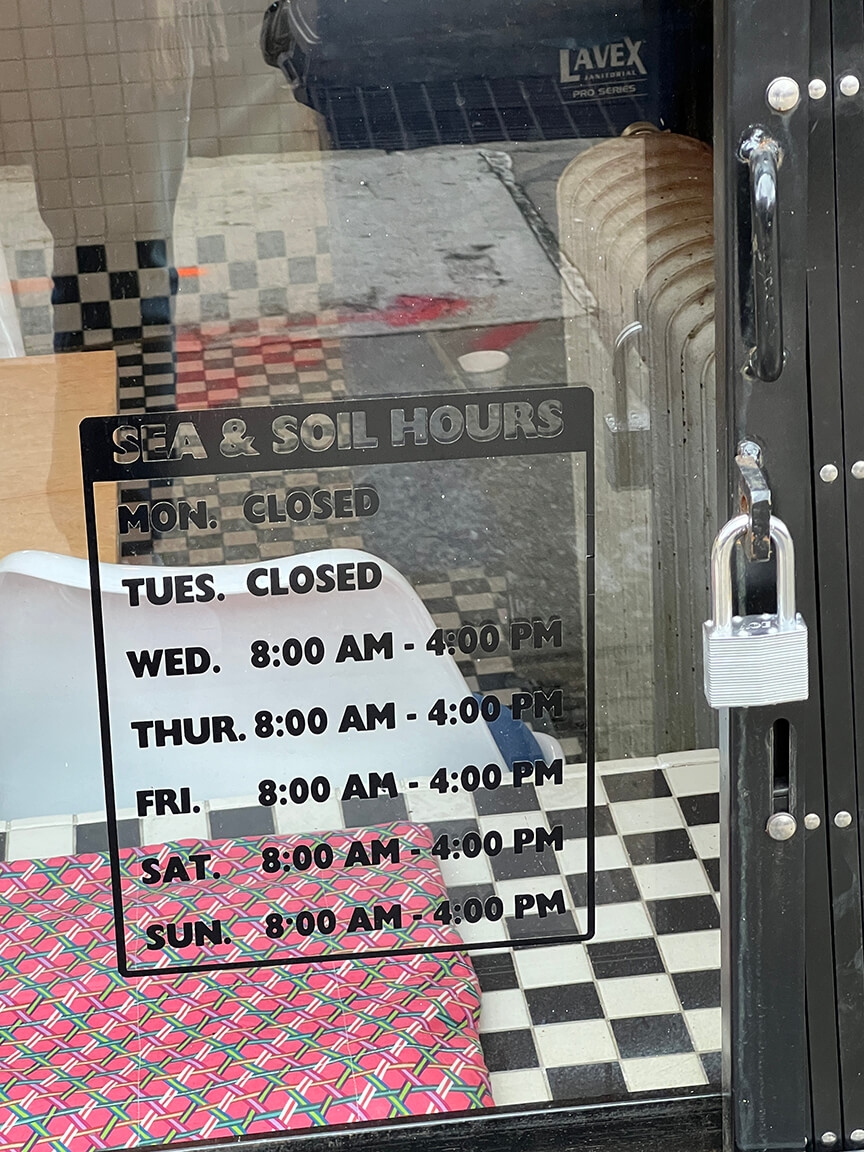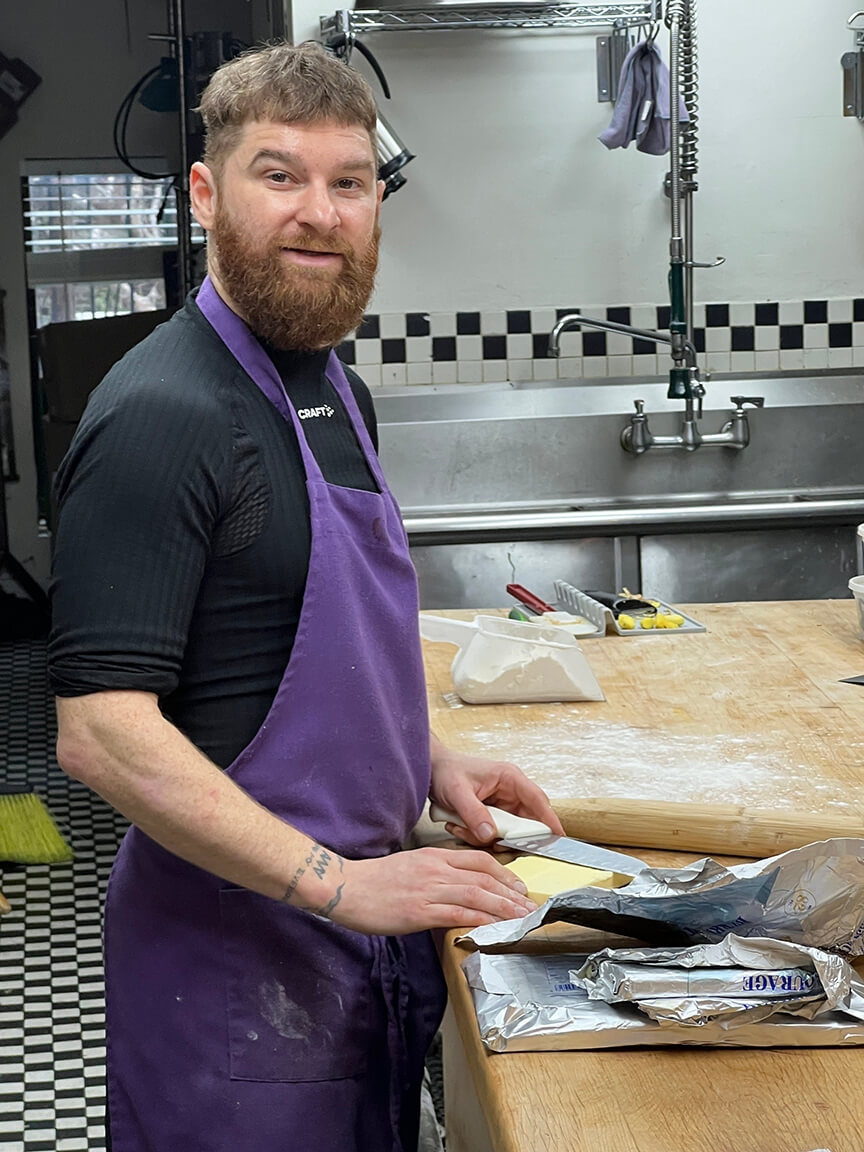Gaby Gignoux-Wolfsohn and Noah Wolf, the founders of Sea and Soil Sandwich Shop, believe the answer might be different for every customer, and even change day to day. That’s why, from the start, their worker-owned co-op has employed a sliding scale to allow each customer to choose the price that best fits their budget.
“We use a sliding scale to make our prices more affordable while still being sustainable for us,” says Noah. “Our sliding scale starts at $9. It would be great to just offer a sandwich for $9 or less, but with the ingredients we use and our desire to pay a real living wage it really wouldn’t be possible.”
Customers choose their own price between $9 and $16 for each sandwich from the shop. The aim is for those with more means to help subsidize the cost of freshly baked, locally sourced breakfast and lunch options for customers who can’t as easily afford them.
“Bread is the people’s food. Sandwiches are the people’s food, certainly I think in many ways in New York,” he adds. “We want as much as we can to make food affordable to as many people as possible.”
Gaby says that while the concept is met with curiosity by many first-time customers, their regulars have come to embrace it. Some will change their price day to day, based on how they are doing that week.
“It opens up conversations and it’s cool how open people are to talking about how we all are doing financially, which is not something we expected at all, and obviously that is an important community issue.”
Their six month old storefront and kitchen on President Street is the culmination of years of preparation. Both have spent long careers working in restaurants, but Sea and Soil started as a weekend project while both were employed in second careers as teaching artists through the Sunset Park based Center for Family Life.
During the spring of 2020 they set up sandwich popups in Prospect Park, baking and preparing sandwiches on weekends. The takers were few at first but they immediately began to make connections and earn followers.
A search for a more permanent home led them to a storefront owned by recently retired neighborhood baker Margaret Palca, and they were delighted to find not just a viable commercial kitchen but a shop to sell from as well, and a kindred spirit in a landlord.
They acquired equipment from Palca and used every dollar they could put together to build out the store themselves. “We ran out of every last penny right before we opened,” says Noah.
They bake their own naturally leavened bread in house and source ingredients locally whenever possible. The goal is to create fresh, well balanced sandwiches in unexpected but inviting combinations.
“The main thing is wanting them to be interesting combinations and in some way kind of different,” says Gaby. “A lot of our sandwiches also feature a lot of veggies, which makes you feel good after you finish it,” she adds.
Many of the sandwiches are old favorites, and they are constantly brainstorming new ideas.
“I really think of it, as someone who played in bands for a long time, as a very similar collaborative process. Someone brings an idea, sometimes it’s very fleshed out, sometimes it’s just a riff essentially,” Noah says. “You could have a sandwich place on every corner because sandwiches are amazing and I always love to be near a sandwich. We are very open-minded to what can be on a sandwich.”
Neighbor Andrea Michelcic stopped in to warm up one rainy day and has been coming back nearly daily since.
“How can you not love them?” she asks.”The delightful energy the storefront brings, and the delicious, thoughtful baked goods. Everything is good!” Her favorite sandwich is the Laith, a combination of smoked trout, beet pickled eggs and manchego on sesame arbol bread.”
Arif Mansuri travels from Carroll Gardens. “It’s such a unique place. They make amazing stuff –and they’re nice!” His favorite is the Rafa, a popular breakfast sandwich of herbed eggs and cheese on olive bread.
The shop also offers house baked pastries, muffins, breakfast sandwiches, and a few surprises. A standout original creation, the scallion pancake croissant, sells out every Saturday morning, and Sea and Soil has begun making doughnuts every Sunday, which have sold out every week as well.
The first Wednesday of every month they are now open late to offer a collection of traditional and more adventurous pizzas, with vegan options available as always.
Despite the long hours, they are having fun and feel welcomed in the neighborhood.
“The level of trust that people have given us to try us out and consistently come back is really cool and a really special feeling,” Gaby says. “It feels like a great honor.”
Built from scratch
Noah feels grateful to finally have a home for their shop. “We came in with nothing. We were at the entrances to Prospect Park yelling out “sandwiches!” and we’d sell like 4 and call that a win. We started from zero with a couple hundred dollars for ingredients and rolled over the money. We truly built it from scratch and so it feels like an incredible honor to do it and an incredible miracle in a certain way that we have a brick and mortar space in New York which I didn’t think we’d ever be able to do because it’s so expensive. It’s incredible!”
There is also pride in having helped create a community for like minded neighbors and regulars.
“We’ve now built something that is honest enough that, one, it’s attracted a group of people that we care about and who hold similar values in the world, and, two, those people come often enough that they find each other here,” he says.
As they continue to grow they are planning to bring in more co-op workers, who will also share equal ownership with them in the company. Creating a new model for worker owned businesses in what can often be a low-paying, exploitative sector inspires them as much as the quest for the next perfect sauce.
“As many people as possible need to be doing things a little differently and what’s really special is the connections we’ve made with other co-ops,” Gaby says.
Sea and Soil is their opportunity to do things a little differently and show that this model can be successful.
“With a sliding scale or worker ownership or paying people a living wage there’s an idea that those things just don’t work and I do believe that we can make these things work – we just have to build a world in which they’re supported,” Noah says. “And you do that by doing it. The examples have to be set. The mistakes have to be made. The lessons have to be learned. Yes, of course, it’s a business. We sell things. But we do hope to do something a little beyond that as well.”
Sea and Soil 102 President St, between Hicks and Columbia, (347) 294-4442












